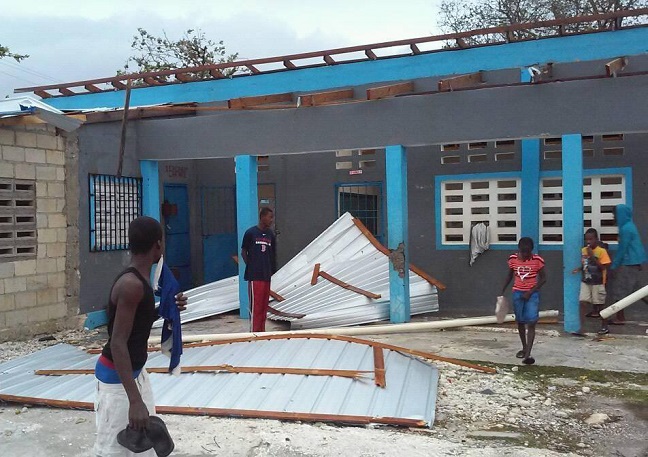OCTOBER 17:
The Salvation Army in Haiti is providing assistance to a number of people in communities affected by Hurricane Matthew. Food distributions have taken place in Croix-des-Bouquets (outside of Port-au-Prince), Luly, Petit Goâve, St Louis du Sud, Aquin, Fonds-des-Negres and La Fosse.
An important aspect of the disaster response is the participation of community action teams (CATs) which were formed and trained in 60 communities after the 2010 earthquake. The teams have already mobilised to assess their local situations and are providing assistance at the point of need. Resources are hard to come by, but the CATs are already responding where they can.
Food is being provided to 300 people in La Fosse. A Salvation Army assessment team visited the town and described it as "completely overtaken by total disaster." Captain Pierre Gesner Aristhilde, corps officer at La Fosse Corps told the visiting team that an estimated 95 percent of the town's 4,500 inhabitants had been badly affected by the hurricane. Trees had been torn down, killing domestic animals and ripping through the roofs of houses. Many buildings lost their roofs simply from the power of the winds. The recovery is being hampered by a cholera outbreak which has already claimed the lives of several people from the town, including two Salvation Army soldiers.
Eighty people who are sheltering in the Salvation Army school building (35 children, 25 women and 20 men). Many others are living in their ruined, often roofless houses. Captain Aristhilde says the community is in desperate need of food, drinking water, cholera treatment and materials with which to repair houses.
Across Haiti, several Salvation Army buildings suffered significant damage, with a number losing roofs. The immediate priority is to repair schools so as to lessen the effect on children's education.
Timothy, who is sheltering at the Salvation Army school in La Fosse, summed up the frustration and anxiety felt by many people in La Fosse and other affected communities. "We only look up to God now," he told the visiting Salvation Army team, "because all our hopes are gone."
Experienced international assessment personnel have now arrived in Haiti to provide assistance to local teams, bringing additional resources to enhance the immediate relief effort and providing help with longer-term recovery options.
OCTOBER 7:
The Salvation Army in Haiti is providing food and support to people who have been forced from their homes by Hurricane Matthew, the strongest storm to hit the Caribbean in a decade. The full extent of the disaster is only now becoming clear, with more than 400 people known to have lost their lives. Much of the south of the country is still unreachable because the strong winds and heavy rain have damaged and destroyed roads and bridges. The continuing path of Hurricane Matthew is also making it difficult to fly in supplies.
An initial sum of US$20,000 has been provided through International Headquarters in London to purchase rice, oil, meat, beans and other basic food items for distribution to some of the people who had to flee their homes and are now living in temporary shelters or "safety zones." The main location is in Croix-des-Bouquets, where 800 people – including 105 children – are being sheltered. Food is also being distributed in Port-au-Prince, Fonds-des-Negres, Aquin and Petit-Gouâve.
In Port-au-Prince, The Salvation Army's clinic has reopened and is can now offer treatment to people who were injured in the disaster.
The funds provided so far will enable The Salvation Army to give beneficiaries a hot meal every day for eight days, buying valuable time to fully assess the situation and discover the most-urgent needs. Repairs will be needed at a large number of Salvation Army schools and other buildings that have been damaged, with several losing their roofs.
Divisional Projects Officer Major John Bundu concludes his report of the current situation with thanks to Salvationists and friends around the world for "your prayer support, concern and care for Haiti during this period of natural crisis."
The Salvation Army in Haiti is providing assistance to a number of people in communities affected by Hurricane Matthew. Food distributions have taken place in Croix-des-Bouquets (outside of Port-au-Prince), Luly, Petit Goâve, St Louis du Sud, Aquin, Fonds-des-Negres and La Fosse.
An important aspect of the disaster response is the participation of community action teams (CATs) which were formed and trained in 60 communities after the 2010 earthquake. The teams have already mobilised to assess their local situations and are providing assistance at the point of need. Resources are hard to come by, but the CATs are already responding where they can.
Food is being provided to 300 people in La Fosse. A Salvation Army assessment team visited the town and described it as "completely overtaken by total disaster." Captain Pierre Gesner Aristhilde, corps officer at La Fosse Corps told the visiting team that an estimated 95 percent of the town's 4,500 inhabitants had been badly affected by the hurricane. Trees had been torn down, killing domestic animals and ripping through the roofs of houses. Many buildings lost their roofs simply from the power of the winds. The recovery is being hampered by a cholera outbreak which has already claimed the lives of several people from the town, including two Salvation Army soldiers.
Eighty people who are sheltering in the Salvation Army school building (35 children, 25 women and 20 men). Many others are living in their ruined, often roofless houses. Captain Aristhilde says the community is in desperate need of food, drinking water, cholera treatment and materials with which to repair houses.
Across Haiti, several Salvation Army buildings suffered significant damage, with a number losing roofs. The immediate priority is to repair schools so as to lessen the effect on children's education.
Timothy, who is sheltering at the Salvation Army school in La Fosse, summed up the frustration and anxiety felt by many people in La Fosse and other affected communities. "We only look up to God now," he told the visiting Salvation Army team, "because all our hopes are gone."
Experienced international assessment personnel have now arrived in Haiti to provide assistance to local teams, bringing additional resources to enhance the immediate relief effort and providing help with longer-term recovery options.
OCTOBER 7:
The Salvation Army in Haiti is providing food and support to people who have been forced from their homes by Hurricane Matthew, the strongest storm to hit the Caribbean in a decade. The full extent of the disaster is only now becoming clear, with more than 400 people known to have lost their lives. Much of the south of the country is still unreachable because the strong winds and heavy rain have damaged and destroyed roads and bridges. The continuing path of Hurricane Matthew is also making it difficult to fly in supplies.
An initial sum of US$20,000 has been provided through International Headquarters in London to purchase rice, oil, meat, beans and other basic food items for distribution to some of the people who had to flee their homes and are now living in temporary shelters or "safety zones." The main location is in Croix-des-Bouquets, where 800 people – including 105 children – are being sheltered. Food is also being distributed in Port-au-Prince, Fonds-des-Negres, Aquin and Petit-Gouâve.
In Port-au-Prince, The Salvation Army's clinic has reopened and is can now offer treatment to people who were injured in the disaster.
The funds provided so far will enable The Salvation Army to give beneficiaries a hot meal every day for eight days, buying valuable time to fully assess the situation and discover the most-urgent needs. Repairs will be needed at a large number of Salvation Army schools and other buildings that have been damaged, with several losing their roofs.
Divisional Projects Officer Major John Bundu concludes his report of the current situation with thanks to Salvationists and friends around the world for "your prayer support, concern and care for Haiti during this period of natural crisis."










Leave a Comment